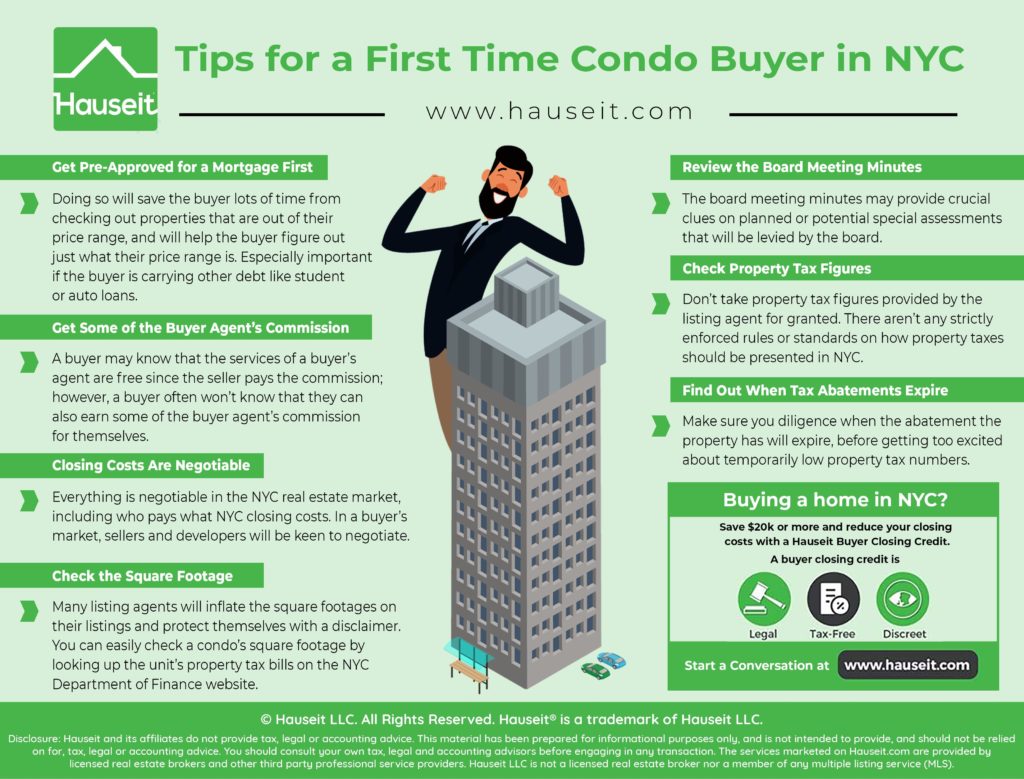Buying a condo in NYC may seem easy, but a first time condo buyer in NYC faces many challenges and pitfalls that can be extremely costly down the road. For example, did you know that both property tax figures and square footages are commonly inflated by listing agents? Or how about the fact that you can get a portion of your buyer agent’s commission back at closing? We’ll discuss tips for a first time condo buyer in NYC that you’ll wish you had known before buying.
Table of Contents:
A first time condo buyer will save a lot of time by getting pre-approved for a mortgage before starting their search. Doing so will save the buyer lots of time from checking out properties that are out of their price range, and will help the buyer figure out just what their price range is.
After all, why waste a bunch of time narrowing down a list of $5 million properties when your bank will only allow you to borrow 80% on a $2 million property?
This is especially important if you are carrying other debt such as student loans, auto loans or credit card balances.
This other debt will negatively affect your Debt-to-Income Ratio (DTI Ratio) and may cause you to be approved for far less than you had imagined.
Get a 2% Rebate When You Buy
Save thousands on your home purchase with a buyer agent commission rebate from Hauseit
A first time condo buyer may know that the services of a buyer’s agent are free since the seller pays the commission; however, a first time condo buyer often won’t know that they can also earn some of the buyer agent’s commission for themselves.
The truth is, the seller typically signs an Exclusive Right to Sell Listing Agreement whereby they agree to pay 6% in commission regardless of how the buyer is found.
In practice, this commission is typically split equally per MLS rules between a buyer’s agent and the seller’s agent. As a result, you should never naively believe that your buyer’s agent is working for you pro bono. They are getting just as much commission as the seller’s agent!
So how can you get some of the buyer agent’s commission back? By signing up for a Hauseit Buyer Closing Credit and working with one of our experienced partner brokers who have discreetly agreed to give you back $20,000 or more at closing.
Save 2% On Your Home Purchase
Save thousands on your home purchase with a buyer agent commission rebate from Hauseit
Everything is negotiable in the NYC real estate market, including who pays what NYC closing costs. In a buyer’s market, sellers and developers will be keen to negotiate and will often offer to take on some of the buyer’s closing costs, such as the NYC Mansion Tax.
If you a buying a new construction home in NYC, it’s even more important to understand that you can negotiate with the sponsor on closing costs. In fact, sponsors and developers are much keener to negotiate on closing costs vs headline listing prices, especially if they have a lot of inventory they need to sell.
The last thing they’ll want to do is to reduce listing prices which will make it harder to sell the rest of their units. As a result, developers will always be more willing to negotiate on non-optical items like closing costs.
Unlike in a re-sale, sponsors typically expect the buyer to pay their NYC and NYS transfer taxes and attorney’s fees in a typical new development purchase. If you don’t know that this is negotiable, you can easily be led to believe that this is just the way that things are done and accept it.
However, an experienced buyer’s agent will tell you that this is all negotiable, especially in a soft real estate market. You can easily make an offer stipulating that you will not be paying any closing costs on the sponsor’s behalf!
One of the biggest mistakes that a first time condo buyer in NYC will make is to not verify the square footage of a property. Even though it’s relatively easy to find the official square footage for a condo unit, many listing agents will inflate the square footages on their listings and protect themselves with a disclaimer saying the figure is simply an estimate.
Keep in mind that there’s no standard for how to measure square feet for real estate in NYC. Some older buildings will be more conservative and only list the interior square footage on their offering plans. However, many new construction buildings will be more aggressive and include wall space1 and even common areas such as the hallway or elevator in the square footage.
You can easily check a condo’s square footage by looking up the unit’s property tax bills on the NYC Department of Finance website. Look for a statement called “Notice of Property Value” and you’ll see a section where the unit’s square footage is listed, typically on the second page. Keep in mind that the city pulls this data typically from the building’s original condo offering plan, which your lawyer can inspect for you during legal and financial due diligence.
1We’ve heard many experienced brokers tell us that it’s common to include 50% of shared wall space and 100% of exterior wall space in the square footage. The reasoning is if you combine apartments and knock down the shared wall, you’ll get 100% of the now cleared wall space. In a similar vein, if it’s an exterior wall that is not shared, you should include that in your square footage calculation since no one else is using it. With that said, we’re certain that many others will disagree with this approach, and argue that only interior or even only useable interior square footage should be used.
A Full Service Listing for 1%
Sell your home with a traditional full service listing for just one percent commission.
Most buyers will leave it to their lawyer to make an appointment with the co-op or condo’s managing agent to review the condo board meeting minutes in person. We recommend taking matters into your own hands and going with your attorney when he or she goes to review the board meeting minutes.
After all, since you’ll be the one buying the apartment, wouldn’t it be better for you to also review what the board is discussing at its meetings?
Plus, you’ll get an idea of whether your potential future neighbors and board members are nice, competent people or not.

You’ll also get a sense of how the building is run, and just how strict the board is on enforcing building rules.
Furthermore, the board meeting minutes may provide crucial clues on planned or potential special assessments that will be levied by the board.
For example, did the board discuss the Local Law 11 façade inspection that the building just failed? That may be the harbinger of an extremely expensive bill to replace or renovate the building’s façade.
Don’t take property tax figures provided by the listing agent for granted. There aren’t any strictly enforced rules or standards on how property taxes should be presented in NYC.
Whereas in the Hudson Valley the OneKey MLS will require all property tax figures to be an annual figure before any exemptions or abatements, there are no such rules in NYC.
In the NYC real estate market, property tax figures are typically only required to be monthly.
However, there’s no real specification (at least none that are widely known or enforced) on whether the figure has to be adjusted for abatements or exemptions, or even whether it must be a prior year figure or an anticipated figure.
In practice, what many NYC real estate listing agents will end up doing is take the annual property tax amount post abatements and exemptions from the latest quarterly property tax bill, and divide it by 12.
This will be advantageous to the seller because the new buyer may not be eligible for the seller’s abatements and exemptions. For example, listing agents will typically include the Cooperative and Condominium Tax Abatement of 17.5% for properties assessed at $60,001 and above.
However, the new buyer may be an investor and won’t be eligible for that abatement because it won’t be a primary residence. As a result, the property tax figure listed is better than it really will be for some buyers.
Get a 2% Rebate When You Buy
Save thousands on your home purchase with a buyer agent commission rebate from Hauseit
Properties with tax abatements or exemptions like the 421a Tax Abatement or the 421g Tax Abatement will usually list the reduced property tax figure to account for the abatement, even if the abatement will be expiring the very next year.
So make sure you diligence when the abatement the property has will expire before getting too excited about temporarily low property tax numbers.
You’ll also need to be careful about buildings that have gotten lazy with disputing over-assessments in property value because they are under one tax abatement or another.
When that tax abatement expires, the building might be surprised with a huge increase in property taxes because assessed values have increased so much over the years without being disputed.
Save 2% On Your Home Purchase
Save thousands on your home purchase with a buyer agent commission rebate from Hauseit
Disclosure: Commissions are not set by law or any Realtor® association or MLS and are fully negotiable. No representation, guarantee or warranty of any kind is made regarding the completeness or accuracy of information provided. Square footage numbers are only estimates and should be independently verified. No legal, tax, financial or accounting advice provided.






